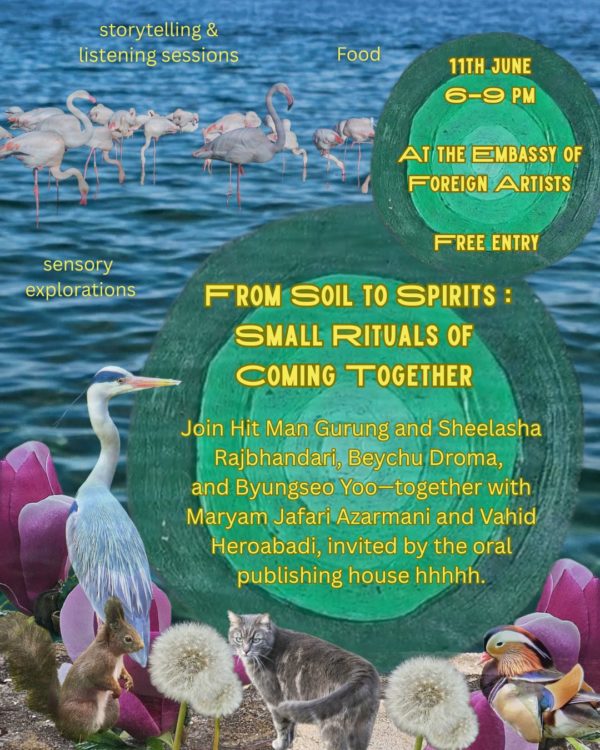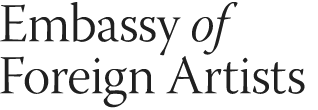
Wednesday 11th of June 2025
Venue: Embassy of Foreign Artists
Time: 6–9 PM
Free entry
Dreams and speculative visions are acts of reclamation, we reassert our agency and refuse the limitations imposed upon us. In a world where oppressive systems act to control identities, land, and bodies, imagining otherwise is itself resistance.
Where extractive economies benefits from burnout, anxiety, imposter syndrome and isolation,
small rituals of coming together,
friendships,
communal acts,
shared meals,
moments of rest,
collective imagination,
become acts of defiance and healing.
We reclaim space for diverse ways of being, loving, and relating: not just as an act of survival, but as a way to create worlds beyond the structures that seek to contain us.
Small Rituals of Coming Together holds space for reflection and rest, a quiet continuation of the slow practice of simply being together. Over the past months, Hit Man and Sheelasha have approached their residency as a living, shifting ground for relational exploration. Rooted in conversation, their process has approached collaborations and friendships not as fixed entities, but as fragile, transformative acts, continually co-constructed. Building on this spirit of unfolding connection, we come together around stories, rituals, and meals, where translation, role circulation, and imagination become gentle tools of collective resistance against standardized forms of cultural and countercultural production.
Extending this ethos, the Embassy of Foreign Artists opens its space as both dwelling and site of exchange. Here, hospitality becomes a relational act where the roles of host and guest blur, entangle, and sometimes invert, creating a shared terrain for presence and connection.
From this space, Hit Man Gurung reflects on what happens when the bond between people and nature begins to break, when forests stop breathing, rivers forget their dance, and ancestral lands disappear. Amid changing seasonal patterns and shifting migratory paths of birds, animals, and humans, he asks: How can Indigenous memories, songs, and rituals help us understand and navigate these shifts? And can we hope for a future of regeneration and renewal?
We will hear from Maryam Jafari Azarmani and Vahid Heroabadi, invited on behalf of the oral publishing house hhhhh by Mina Achermann and Erell Le Pape. Together, they will publish a mobile, fragile, and open trace, resonating with the invisible forms of alliance and transmission nurtured throughout the residency. It is a way of sharing what needs the sheltering opacity of fugitive oral speech in order to be told.
Beychu Droma gently unsettles the demarcation of the border between the intuitive and the rational. In a world increasingly governed by quantifiable metrics, she reclaims ancient, intangible ways of knowing. Through dreams and the unknown-known, she explores how broader epistemologies might hold space for collective resistance to the corrosive forces of structural oppression.
Inviting us further into the present moment, Sheelasha Rajbhandari guides us through games and sensorial practices related to the body and emotions, opening a space for embodied awareness and playful connection.
An outdoor meal conceived by artist Byungseo Yoo centers on social fermentation; a living, non-linear and collective process of transformation. During the gathering, Byungseo will reflect on fermentation as a practice of survival and co-creation that weaves together humans and more-than-human beings.
The evening concludes with informal conversations over food and drinks, accompanied by sensory explorations. We look forward to welcoming neighbors, friends, unexpected companions, and all who have crossed paths with this project.
Bios
Beychu Drama is the Founder of Art Represent, a platform dedicated to championing artists affected by conflict and displacement, using art as a catalyst for social change. Since its inception, Art Represent has launched the debut solo exhibitions of many powerful voices and collaborated with public institutions, universities, and cultural organisations across the US, EU, and Asia to amplify its mission.
Byungseo Yoo is a visual artist who practices social fermentation—a strategy that counters object-centred representation, the cult of individual authorship, and microbe-phobic purity regimes. Grounded in fleeting yet potent interspecies co-creation, Byungseo subsequently explores diverse forms of participatory art and social sculpture.
Erell Le Pape and Mina Achermann, in addition to cultivating a friendship, form a curatorial duo. They have been working together since 2024, the year they co-founded hhhhh, a fugitive publishing house that primarily focuses on oral text practices. hhhhh does not produce printed matter but inhabits time and space as publication. We invite artists, thinkers, and textworkers to tell, whisper, murmur, read and unwrite in domestic or domesticated environments, and gardens. hhhhh has no place but takes place in many places.
Over the past year, they also co-curated the art space one gee in fog. Their shared research explores orality as a strategy for remaining fugitive in the transmission of stories that have been pushed to the margins. In their way of working, they constantly stumble over what it means to curate as shy and neurospicy beings, and they strive to weave relationships of care and resonance with the people they collaborate with
With hhhhh, they have invited Maryam Jafari Azadi and Vahid Heroabadi for the occasion.
Vahid Herovabadi
He received his high school diploma in Humanities before pursuing seminary studies for 15 years, ultimately advancing to the level of Ijtihad. He also undertook associate degree studies in Political Science and the History of the Iranian Revolution, although he did not complete the degree. His political and social activism includes protest performances highlighting the plight of political prisoners in Iran, as well as using social media to express dissent and raise awareness about human rights violations. Due to his outspoken criticism of the Islamic Republic’s policies, he was permanently defrocked by the Special Court for the Clergy, stripped of his clerical status and banned from acting as a religious authority. He was sentenced to three and a half years in prison, but after serving eight months, he managed to escape from Evin Prison.
Maryam Jafari Azarmani is an Iranian poet, literary critic, and translator born in Tehran. She holds a Ph.D. in Persian Language and Literature from Alzahra University, with her research focusing on discourse and syntax in constitutional period poetry. She has authored 19 poetry collections and multiple research books, some of which have been published internationally. Her work has earned several literary awards, including two Parvin Etesami Literary Prizes. She is also active in teaching, poetry criticism, and literary event organizing, with extensive contributions to literary magazines and academic journals.
Maryam Jafari Azarmani’s poetry often blends social and political themes with deep personal reflection. Her poems explore issues such as identity, freedom, and justice, using sharp imagery and bold language. Through a critical and sometimes ironic tone, she challenges societal norms and brings attention to the struggles of contemporary life in Iran.
Sheelasha Rajbhandari is an artist and curator based in Kathmandu. Her work draws upon embodied and speculative lineages of femininities and ancestral echoes to question the positioning of women and fluid beings across time, landscapes, and cosmologies. Her practice unsettles linear, neoliberal conceptions of time, seeking to decenter patriarchal structures that perpetuate cycles of industrial extraction, isolation, and individual exhaustion. For her, art-making becomes a space for collective remembering and resistance. This ethos shapes her artistic and curatorial gestures, which recompose understandings of Indigeneity, gender, sexuality, worth, productivity, and relationality through acts of intimacy, refusal, gathering and imagining.
Hit Man Gurung is an artist and curator based in Kathmandu by way of Lamjung. Gurung’s diverse practice concerns itself with the fabric of human mobilities, frictions of history, and failures of revolutions. While rooted in the recent history of Nepal, his works unravel a complex web of kinships and extraction across geographies that underscore the exploitative nature of capitalism. These narratives revolve around the lived experiences of migrants caught between a dehumanizing transnational labor-based industry and an apathetic nation-state. He furthermore invokes Indigenous methodologies and epistemologies to fundamentally reconfigure contemporary artistic praxis.

